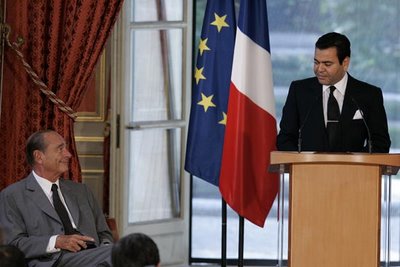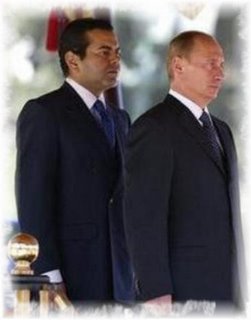Prince Moulay Rachid marks the beginning of Holy Month of Ramadan

Rabat, September 25, 2006 - - His Royal Highness Prince Moulay Rachid marked the beginning of Holy Month of Ramadan.
The Fast of Ramadan
Ramadan is the ninth month of the Muslim calendar. The Month of Ramadan is also when it is believed the Holy Quran "was sent down from heaven, a guidance unto men, a declaration of direction, and a means of Salvation"
It is during this month that Muslims fast. It is called the Fast of Ramadan and lasts the entire month. Ramadan is a time when Muslims concentrate on their faith and spend less time on the concerns of their everyday lives. It is a time of worship and contemplation
During the Fast of Ramadan strict restraints are placed on the daily lives of Muslims. They are not allowed to eat or drink during the daylight hours. Smoking and sexual relations are also forbidden during fasting. At the end of the day the fast is broken with prayer and a meal called the iftar. In the evening following the iftar it is customary for Muslims to go out visiting family and friends. The fast is resumed the next morning
According to the Holy Quran:
One may eat and drink at any time during the night "until you can plainly distinguish a white thread from a black thread by the daylight: then keep the fast until night"
The good that is acquired through the fast can be destroyed by five things -
- the telling of a lie
- slander
- denouncing someone behind his back
- a false oath
- greed or covetousness
These are considered offensive at all times, but are most offensive during the Fast of Ramadan
During Ramadan, it is common for Muslims to go to the Masjid (Mosque) and spend several hours praying and studying the Quran. In addition to the five daily prayers, during Ramadan Muslims recite a special prayer called the Taraweeh prayer (Night Prayer). The length of this prayer is usually 2-3 times as long as the daily prayers. Some Muslims spend the entire night in prayer
On the evening of the 27th day of the month, Muslims celebrate the Laylat-al-Qadr (the Night of Power). It is believed that on this night Muhammad first received the revelation of the Holy Quran. And according to the Quran, this is when God determines the course of the world for the following year
When the fast ends (the first day of the month of Shawwal) it is celebrated for three days in a holiday called Id-al-Fitr (the Feast of Fast Breaking). Gifts are exchanged. Friends and family gather to pray in congregation and for large meals. In some cities fairs are held to celebrate the end of the Fast of Ramadan.



